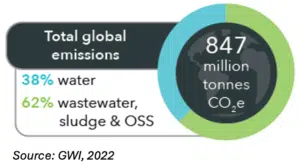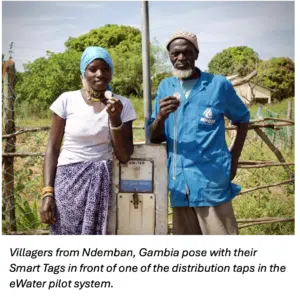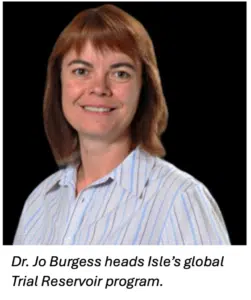Explore Isle’s groundbreaking Climate Change Trial Reservoir in our “Success Stories” blog series.
Success Stories: Isle’s Climate Change Trial Reservoir
Reshmina William, PhD (Project Manager, Isle Americas)
Welcome to “Success Stories,” a blog series that highlights the lessons learned and achievements behind Isle’s most innovative programs. In this first installment, we take an in-depth look at Isle’s flagship non-profit initiative: the Climate Change Trial Reservoir. I’ll be sharing how the Isle’s Climate Change Trial Reservoir came into existence, the specific challenges each Reservoir addresses, and the inspiring stories of the people who have contributed to the program’s success over the past three years.
Our climate is changing
In 2021, at the height of a global pandemic, delegates from nearly 200 countries descended on Glasgow, Scotland for COP 26. The conference was intended to build on the climate pledges set forth in Paris in 2016. Instead, attendees came away with a sense of urgency: the science showed irrefutably that the impacts of human-caused greenhouse gas emissions would soon push our climate beyond a point of no return. As U.S. President Joe Biden put it, climate change was “the biggest challenge of our collective lifetimes.”
The impacts of our warming climate on both the natural world and the resilience of our man-made systems – including those we use to clean and treat our water – are stark. Climate change is exacerbating both water scarcity and water-related hazards, as rising temperatures
disrupt precipitation patterns around the world.
Utilities are being forced to adapt to the realities of a changing climate. In Fredericktown, Missouri in the U.S., a drought in 2012 nearly crippled the town’s water infrastructure after plunging water levels exposed the bed of town’s lake (its main water source). Other utilities, such as those in the Netherlands, must grapple with flooding and rising sea levels. Still others must contend with water quality challenges such as harmful algal blooms, which are exacerbated by warming water temperatures.
A call to action

Utilities are not only impacted by climate change, but also contribute significantly towards global greenhouse gas emissions. The global water sector generates nearly 847 million tonnes of CO2e every year (roughly 2% of global carbon emissions).
Some of those emissions stem from the electricity needed to treat, convey, heat, and dispose of our water and its by-products. Other emissions arise from the biological processes we use to treat our wastewater, which generate both methane and nitrous oxide – greenhouse gases with potency far greater than that of carbon dioxide. There’s even carbon “embedded” in the energy used to make and pour the concrete used to build our water infrastructure.
For the water sector, mitigating climate change will thus mean significantly changing the way we use energy, improve system efficiencies, and develop our treatment processes. And we need to do so quickly. As Dr. Piers Clark, Founder of Isle Utilities, has said,
“The water sector’s pace of change [in response to climate change] can be best described as genteel. At most, it’s irresponsibly sleepy.”
Fortunately, innovators and entrepreneurs across the water sector are already working to solve these technological challenges. But in a competitive – and often risk-averse – market, they can struggle to commercialize their technologies.
Vendors need to pilot their technologies to prove their value and scalability in the field. However, utilities often don’t have the funds to trial every technology that comes through the door. Even if a trial commences – and is successful – there’s no guarantee of long-term procurement of the technology. Vendors can thus become stuck in the “piloting valley of death”, conducting trial after trial at multiple utilities without making a sale.
The Trial Reservoir
Isle’s Climate Change Trial Reservoir program helps to de-risk the piloting process for both vendors and utilities, accelerating innovation in the water sector and driving new approaches to climate change mitigation.
The idea behind the Trial Reservoir is simple: a pot of money that can be utilized to provide an unsecured loan to technology companies to cover trial costs. Two things make the Trial Reservoir special, however.
Firstly, procurement terms are agreed with the partner utility as part of the paperwork for the loan. Defining procurement terms up-front (rather than after the trial, as is typical) gives vendors security that if a trial is successful, they will be able to make a sale. The purchase can then be used to repay the vendor’s loan back to the Reservoir.
Secondly, if a trial is unsuccessful, vendors are not required to repay the money they’ve borrowed. In other words, if a trial fails for whatever reason, it’s free. Together, these loan terms help to decouple the piloting process from financial risk for both vendors and utilities.
Isle’s team of experts work closely with vendors and utility end-users to create trials that have meaningful, measurable metrics of success that are agreeable to both parties. Trial Reservoir participants also have access to a wide range of post-trial marketing materials, including spotlights on Isle’s Water Action Platform, to share their success stories with the industry.
To date, the Climate Change Trial Reservoir has successfully completed nine trials at sites around the world. The technologies featured in these trials have gone on to win prestigious national and international awards. The program itself received the Innovation in Decarbonization award at WEX Global 2022, and was featured at the 2022 World Economic Forum.
eWater Services – A Trial Reservoir case Study
Beyond its global accolades, the Trial Reservoir has had a concrete positive impact on the lives of people around the world.
In the villages of Wellingaraba and Ndemban in Gambia, a Trial Reservoir trial completed last year has brought safe, clean, accessible drinking water to the local communities.
In this region, in communities without existing water infrastructure, the job of collecting water for the household primarily falls to women and children. Here, access to clean water is a matter of gender equity, not simply public health.
eWater Services has worked together with the local Water Commission to develop an innovative, sustainable approach to solving this problem. Their system uses solar power to pump and treat borehole well water, which is then distributed by gravity to a series of public Smart Taps. Customers pay for water using Smart Tags that can be used to activate a Smart Tap for 24/7 access to safe, potable water. Credit on Smart Tags can be topped up using a smartphone app, by text, through e-payment services, or through designated vendors at local stores. Although eWater staff are accessible to provide guidance, the program also trains local staff to build and maintain the system, reducing OPEX and building valuable workforce skills.
The eWater Services/Wellingaraba Trial has provided nearly 1,500 people in the two villages with access to clean water. As one local community member puts it, the Taps provide a “lot of peace of mind.” At the same time, eWater Services estimates that the Trial has saved nearly 375 tonnes of CO2e. Following the successful completion of this trial, eWater Services intends to scale up the implementation of its Smart Taps throughout the region.
“The best role in the world.”
When Dr. Jo Burgess first joined Isle in 2019 after a 10-year stint at the Water Research Commission in South Africa (WRC), the world was a very different place. Five years (and a global pandemic) later, Jo looks back on her challenging but rewarding role as Global Head of the Trial Reservoir program with fondness.
“It’s undoubtedly the most difficult, frustrating, and most rewarding job I’ve ever had,” she says. “It’s given me the chance to work with people all over the world, and caused my biggest failures and best successes. Best role in the world.”
One of the defining features of the Trial Reservoir program – and the thing that first drew her to it – is its tangibility. The Trial Reservoir offers an opportunity to make research outputs serve the environment and human society. After 20 years of service in R&D (first at the Water Research Center, then at WISA), Jo strongly believes that development and innovation are “all for nothing if the innovations are not put to good use.”
Jo sees the Trial Reservoir as an important step in the right direction – and a template for success that can be emulated by others.
“Rather than going around just telling utilities they aren’t being innovative enough, [the Trial Reservoir] offers a way to derisk the change process and enable them to become more innovative,” she says.
In the future, she’d like to see the Trial Reservoir model replicated more widely. Speaking of her wishlist for the next five years, Jo would
“love to bring more financial partners on board so we have a bigger pool of money available and can do more, and more ambitious trials… But I’d also like to see the model be copied – in an ideal world there wouldn’t be any trials without a commitment to implement if the trial’s successful in the industry, regardless of whether it was a Reservoir trial or not.”



